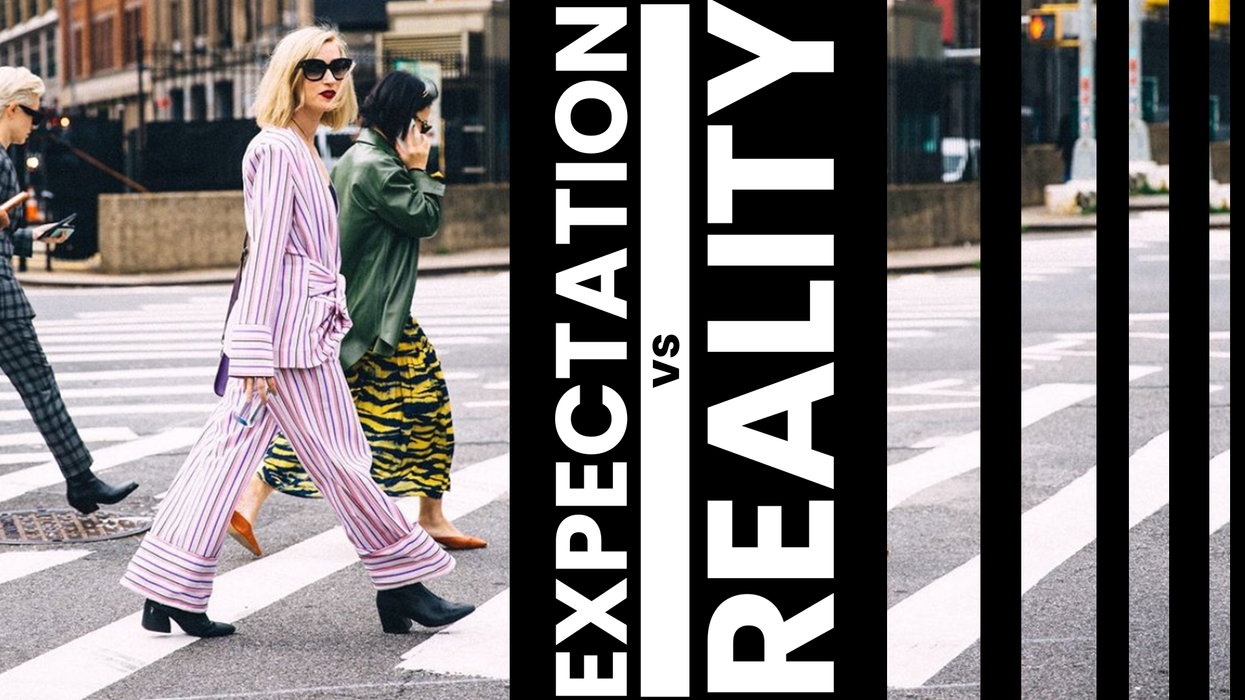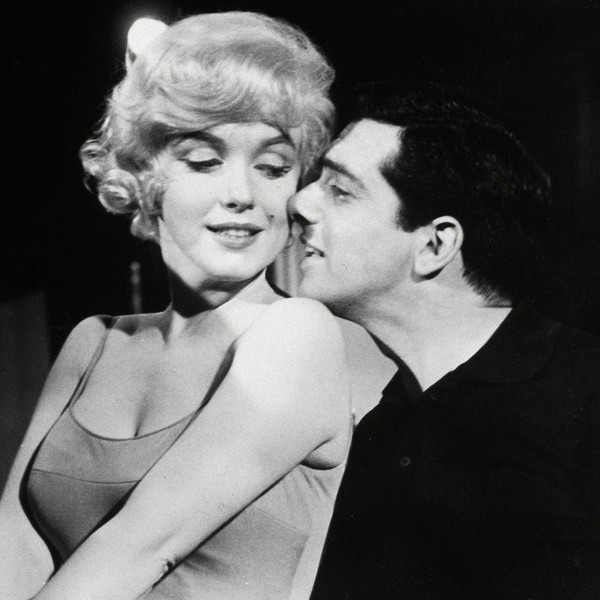What's a Dream Job, Really?
Between pivots and layoffs, I realized you can't count on a dream job to make you happy — so I started chasing a dream life.

Welcome to Expectation vs Reality—a monthly column from writer Gabrielle Korn about the lifelong process of realigning what you expect with what you experience, and what we can all learn from the bumps along the way.
I got my first dream job in the early 2010s, in the beauty department of a digital media company. I was hired as an assistant and also a writer, as these things tend to go. It was a cool company, and there were so many perks—free beauty products, as many bylines as I could churn out, name recognition, access. I wanted to be a professional writer so badly. But it was, as assistant jobs are, grueling. The work was endless and the demands unmeetable. The goalpost was always moving. Over the next two years, I was promoted several times, from assistant to associate to editor, but the promotions never made my life easier; it was always just more work and more pressure for teeny tiny salary bumps.
This was not my dream job, I realized. This was closer to a nightmare. So, I left—for a new dream job at a different publication.
The new dream job had even better perks, even more visibility, and I was a senior level editor this time, so I had a little bit of power. But even still, the true dream of the job always felt just out of reach—even after I received multiple promotions and raises over the years. I felt under-appreciated; like I was doing my boss's job for her, like there would never be enough resources for us to be successful. There were print/digital tensions and frequent ownership changes and layoffs every year. It was constant anxiety. This time, I didn't run when it got hard. I stayed, hoping that the things I needed would come to pass. But they didn't. Even (and, maybe, especially) when I clawed my way into the editor-in-chief role a few years later.
If you want everyone you meet to tell you that your job is a dream, become an EIC. Yes, there were free things, and invites to exclusive events, and proximity to celebrities. But more than that, there were endless work days, sleepless nights, a team of 20 people under me that was chronically overworked and underpaid, traffic goals that could never be met. It was a salary that felt way under the scope of work. I felt further and further away from myself. My success just meant more money for the owners of the company, and I felt disconnected from it. What was wrong with me that I couldn't enjoy my dream job? WHAT ABOUT THE FREE BEAUTY PRODUCTS? The truth is, I never cared about the things that were supposed to make that job a dream. I didn't want to go to fancy events after work wearing a borrowed gown. I wanted to go to sleep.
It had happened again: I'd gotten sucked into a job with the promise of a dream fulfilled, and instead, the reality was that I was so burned out I became physically ill. So when the magazine was sold to a larger company, instead of staying on to see the transition through, I quit.
I started over somewhere else, in a fashion director role. But after a few months, one of my colleagues quit, and instead of replacing her, her workload was added onto my plate without an increase in pay, so I suddenly was the director of fashion, culture, health, and wellness, with no extra resources or support. I wasn't excited about the opportunity. I no longer felt hungry to climb the ladder, taking on more and more work; I knew what was at the top of the ladder, after all. I found myself, again, faced with those same questions: Why doesn't this feel dreamy? Would this workload be appealing to someone else? I realized, eventually, that the problem was not my attitude. It was the system.
So I left—the whole industry. I took a job in tech/entertainment to run a social media platform for the LGBTQ+ audience and moved across the country to L.A. (we’ll get into that another time). My salary was more than doubled. I was given amazing health insurance and surrounded by best-in-class colleagues. A real budget to work with. Work I was less emotionally connected to, but that was interesting and fun. Did I care about social media? Meh. Did I need to? Also meh. What I cared about was that my salary put me in a different economic bracket, and suddenly my entire lifestyle changed. It even afforded me the immense privilege of buying a house. I never thought I'd be able to afford a house!
By this point, it was clear to me that the pandemic had started to shift my ambition, as it did for most people. There had been so much loss and every moment felt more precious than ever; did I really want to spend my one precious life staring at a screen? No! And this seemed, perhaps, like a possible way of working, of existing. Over the next couple of years, as it became clear to me that the job wasn't exactly what I was promised—the corporate environment was full of sharks, and the bottom line mattered more than, well, anything—I held on tightly anyway; perhaps I was burning out, but I was making real money and had work/life balance, and, I often asked myself, shouldn't that matter more?
And then it all fell apart again. After two years, I was laid off along with hundreds of others. I was left with a decent severance package and a feeling of whiplash. I'd moved my whole life to L.A. for this, and now it was gone. But in the immediate aftermath, while I was anxious about being able to make money (I had perhaps too quickly gotten used to my new lifestyle), I quickly realized that I would not miss anything about the work.
Even though getting laid off, frankly, sucked, I was grateful for the privilege of a financial cushion that would allow me to take a few months off and catch my breath. Without it, I probably would have just jumped into the first opportunity I could find and repeated the cycle all over again, as I'd done so many times before. The thing is, it was never my dream to be some sort of pathologically busy girl boss. I don't even really know whose dream that is or where along the way I got to thinking it was mine. The only thing I ever really wanted was to be a writer.
In the wake of getting laid off, the days stretching out before me, I started to wonder if maybe it was time to put my writing at the center of my ambition. Over the course of the jobs described here, I've been writing books. It's the thing I love doing most. Perhaps, I started to think, instead of being someone who writes on the side, I could be a writer with a side hustle; perhaps the dream was there all along, waiting for me to acknowledge it. But because writing doesn't necessarily pay the same as a full-time job, this pivot is more holistic than just getting a new dream job; it's about trying to figure out a dream life.
So what is my dream life? I am largely still figuring that part out. The perks of my old life—beauty products and clothes and invites—have vanished, but these days I'm mostly in my sweatpants, bare faced, anyway. I don't have a boss. Instead, I've taken on a few clients to do consulting and strategy work for. Because I spent so many years in so many different editorial jobs, I've developed a perspective that is valuable to others. As it turns out, while none of those jobs were my dream, they equipped me with the experience to perhaps help other people with theirs. And the best part is that I have time to write. I have two new books in various stages of gestation, and having brain space to dedicate to them feels like a gift. I also have time to lay outside on what I've named my fainting couch, watching the hummingbirds.
For a long time, I had this feeling that a new job had the power to save me. The dream job was never the job I already had. It was always something to be worked towards. But now, I honestly can't think of anything that sounds dreamier than figuring out how to be successful without a dream job. Maybe after a year of this, I will panic about money. Maybe the books won't be successful and I'll run out of ideas and my consulting projects will dry up. Perhaps eventually I’ll get bored. But maybe, more than that, what I need is a break. And what a dream to be able to take one.




